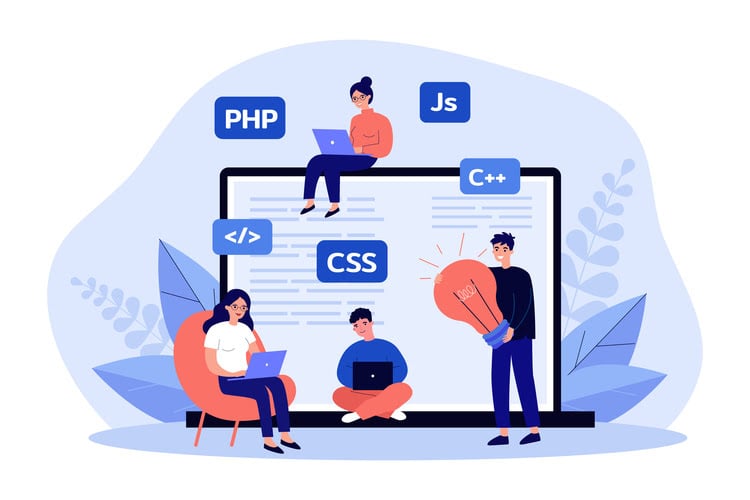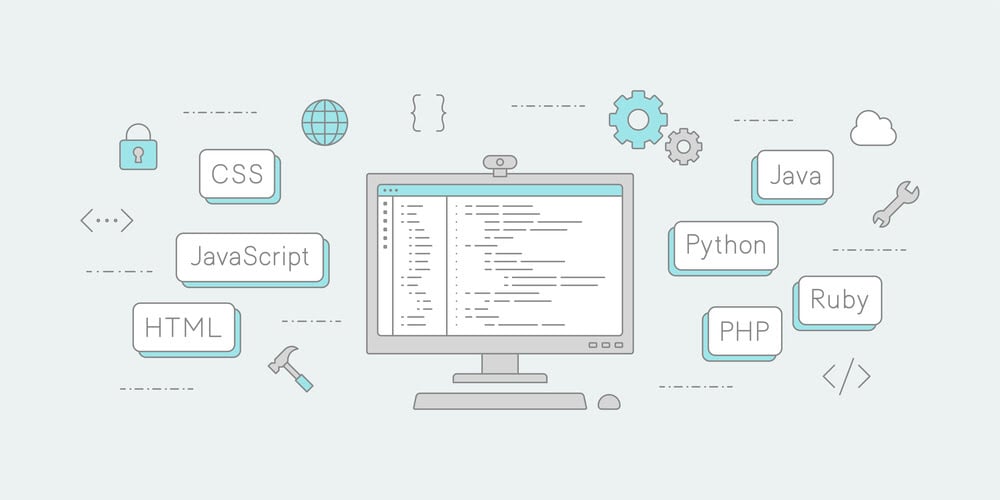Let’s face it, hiring is a pain, and hiring developers in today’s job market is about the least pleasant job you can think of. But there’s no way around it (or at least that’s what most people think, more on that later) - employing experienced programmers is necessary to build a website from scratch or redesign an existing site. You also need to hire developers if you want to maintain your site, review code or expand your dev team.
While it is easy to find lots of candidates for a developer position nowadays, finding a qualified specialist who is the right fit for your project and budget is difficult. This article provides a complete guide to hiring an experienced website developer. Learn the best tips from Deazy’s experts right here.
Key Points
- A website developer is responsible for building a website from the ground up using technologies like HTML, CSS, JavaScript, PHP, Java, or Python.
- There are three types of website developers. They are front-end developers (who build what you see on a website), back-end developers (who develop the database, server and APIs) and full-stack developers (who know front and back-end development).
- One tip for hiring a web developer is to write a detailed project description to identify all the deliverables that must be in the project.
- Other tips are to hire the right programmer (front-end, back-end or full-stack developers) for your project and choose the best hiring options.
- Before signing contracts with the website developers or the software outsourcing agency you hire, you should set clear expectations and agree on deliverables, cost and delivery time.
Who Is a Web Developer?
A web developer is a programmer that builds websites or web apps for businesses and organisations. The programmer will build a dynamic site using coding languages like HTML, CSS and Javascript to build the front end and PHP, JavaScript, Python, or Java for the back end.
Web Developers' Responsibilities

Website developers' roles vary depending on the situation and the project. Here are some of the responsibilities of a programmer:
- Build the front end of a site with mark-up languages like HTML, CSS and Javascript.
- Make a website interactive using JavaScript.
- Develop the back end of a website using technologies like Python, PHP, and Java.
- Store, retrieve, and update information in a database using SQL.
- Collaborating with stakeholders like business owners and team members to get tasks done.
- Write clean and easy-to-debug code.
- Testing the software to ensure it works properly.
- Debugging and fixing errors.
Six Tips for Hiring an Experience Web Developer
Are you ready to build your dream website? Before signing contracts with a web developer, let's examine some of the tips to have in mind.
Write a Project Description
The project description will contain all the deliverables you want in your website development project. What kind of website do you want? Do you want a website from scratch or plan to redesign an existing one?
What technologies will the web developers use to build the website? Do you need front-end or back-end development only?
Asking yourself these questions before you hire a programmer will help you save time and cost and ensure you find website developers with the right expertise.
With a good project description, you can set a budget to prevent overspending. How much you spend on your project depends on how fast you want the site and the developers' experience.
Remember that the more deliverables in your project, the more money you spend on hiring a developer to complete the task.
Writing a project description will eliminate confusion and ensure that you and the programmers understand the deliverables and what it takes to get them.
Choose the Right Website Developer
When hiring a website developer, you must choose the right person. There are three types of developers, some specialised in building different parts of a website. Let's define each type to help determine who you engage for your website development project.

Front-End Developer
A front-end developer is an expert mainly responsible for building the visual components of a website. The components include the navigation menu, contact forms, carousel, drop-down, buttons, images, and text. Some of the skills of a front-end website engineer are
Skills
- HTML. Hypertext Markup Language (HTML) is a website's basic building block used to build the structure. A front-end programmer should know HTML because it is useful in developing the client-side or user interface.
- CSS. Cascading Style Sheet (CSS) is used to style a website, as the name suggests. A front-end engineer can use CSS to design a site layout and add color, font, animations, etc., to make it engaging and attractive.
- JavaScript. Front-end developers must know JavaScript to add interactive features to a website. With JavaScript, the programmer can create an image slider, drop-down menu, multi-step contact form, etc.
- Front-end frameworks. Client-side developers must be able to build websites using front-end frameworks like React, Vue, or Bootstrap. Since frameworks make developing a website faster, the programmer you hire must be familiar with at least one.
- Responsive design. Responsive website design is necessary if your website must be accessible to users on desktops, laptops, tablets, and smartphones. A front-end developer must be able to develop a user-friendly and responsive website.
Back-End Developer
Hire a backend engineer if you want a dynamic website. This expert is responsible for building the backend: the server, database, and APIs that power the website behind the scene. Also, backend developers write the code that triggers an event when users try to fetch their information from the database.

Skills
- Back-end programming languages. Server-side developers must know how to code the backend of a website using programming languages like PHP, Python, Java, and SQL.
- Database management. You should hire a website developer with database management skills to help save, retrieve and update information in a database. Also, the developer should be able to write the code to build the database structure.
- Knowledge of front-end technology. Backend engineers know how to build the client side of a website using front-end technologies like HTML, CSS, JavaScript, and frameworks like Bootstrap, React, and Vue.
- Knowledge of backend frameworks. An experienced backend engineer must be able to develop a website using backend frameworks like Django, Laravel, Expresses, etc.
- API development. APIs establish connections between applications or websites to enhance user experience. Back-end developers must know common APIs: JSON, REST, SOAP, etc.
Full-Stack Developer
Hire a full-stack developer if you want a complete web development project. A full-stack developer is a programmer that works on both the front-end and back-end of a website. The programmer is skilled in building the user interface of a site and the database, server, and APIs.
Skills
- Knowledge of front-end technologies. A full-stack developer must know how to use front-end technologies like HTML, CSS, and JavaScript and frameworks like Vue, Bootstrap, React, Angular, etc., to build the user interface of a website.
- Backend technologies. Full-stack engineers must know how to develop a site with programming languages like Java, Ruby, Python, PHP, SQL, etc.
- Database and cache. You should hire a programmer with knowledge of database structure and management using programming languages like MySQL, Oracle, MongoDB, and SQLServer.
- Responsive web design. Responsive design is one of the skills of a programmer that builds the front end and back end.
- Version control. With version control, a full-stack engineer can keep track of all the changes made in the code and revert to an earlier version in case of an error.

Soft Skills Every Website Developer Must Have
Tech skills are not the only thing to consider when hiring website developers. They must demonstrate the ability to communicate and collaborate to get the job done, organise and manage the project and solve problems that arise.
- Communication. Website developers discuss how to fulfil a web development project and ensure that all the deliverables are met. They must collaborate with all the stakeholders involved in creating the site.
- Problem-solving skills. Issues can arise when developing a website. You should hire programmers with quick problem-solving skills.
- Time management. Since you and the developers will work on a tight deadline, you should go for one that can manage time perfectly and deliver before the deadline.
- Detail-oriented. Programmers must pay attention to every detail in a project, as little changes can make a big difference.
Choose a Hiring Option
After writing your project details and knowing the kind of website developers you want to hire, you should choose a hiring option that works for you. Businesses can hire freelance web developers or in-house developers or find the right fit by outsourcing their projects to a nearshore development agency.
Freelance Web Developers
Freelance web developers are independent contractors that work for a business or an organisation on a temporary or long-term basis. If you have a web development project that is not too complex and requires the service of a single developer, you can hire a freelancer.
Aside from that, freelance programmers charge less than in-house developers, so if you are on a budget, you can choose one. The cons of engaging freelancers are unreliable communication, fewer resources, and lack of management.
Since freelancers don't work in a traditional office, communicating with them can be a problem if they are in a different time zone. Also, unlike software outsourcing agencies with many developers across tech stacks, freelancers are limited to certain skills.
So, if you need, for example, front-end and back-end development, you have to hire different web developers, which can lead to inconsistent workflow.
Another setback in hiring freelancers is that they are difficult to manage. Without a project manager to oversee projects, keeping track of progress will be difficult and can hamper your project if the freelance developer fails to meet the deadline.
In-House Developers
You can hire someone locally if you want the web developer to be part of your in-house team. The advantage of hiring in-house is that communication is easy and quick, and team members can collaborate on the project and get tasks done.
Also, the developer will become familiar with your products or services quickly and be in a position to create a site that speaks to your customers.
The cons of hiring in-house are that you must undergo the time-consuming process of interviewing, vetting, and onboarding the developer. Also, you must rent office space, buy resources and pay other benefits besides the salary.
Outsourcing Your Project
The third hiring option to choose when you want to hire a web developer is to outsource your project to a software outsourcing agency. There are three outsourcing models, but the best is nearshore development.
Onshore outsourcing is when you hire remote web developers from the same country. This model makes it easy for you to find experts with the same work culture and language. But since you and the developers are in the same country and the cost of living is the same, it is not cost-saving like offshore and nearshore outsourcing.
In offshore development, you outsource your project to programmers in a far country. This method is cost-saving because you and the programmers live in countries with different living costs, and they will charge less. But there can be a delay in communication because you and the programmer are in different time zones.
Nearshore development is the third and the best option because you and the web developers are in the same or similar time zones and share similar work culture. Also, you can get access to lots of engineers across tech stacks when you hire a nearshore development agency.
Check the Website Developer's Portfolio
As part of your vetting process, you will want to see the work the programmer has done in the past. One way to do that is by evaluating the portfolio. A portfolio is a website that showcases the programmer's past projects.
When you examine the website developer's previous work, you will be able to see if their previous experience is relevant to your current project. Also, you should check for positive feedback from past clients that prove they are satisfied with past projects.
If you outsource your web development project to a nearshore development agency, you can check for reviews and past works on their websites and read about them from trusted review platforms.
Another thing to consider is experience. Do you want a junior, mid-level, or senior programmer to work on your project? If you want to make little changes to your site, you can hire junior developers, but if you have a large web development project, you should go for one with more than four years of experience.
Agree on the Deliverables, Cost, and Delivery Time
You have to finalise the project details if you have gotten a website developer with the right experience and skills. List all the deliverables and agree on what to expect to receive so they can work more efficiently with clear expectations.
Cost is something to consider when hiring website developers. While most developers will accept hourly pay, others will only accept a fixed amount per project. Plan carefully to ensure that the amount you pay is within your budget.
Aside from deliverables and cost, setting a clear deadline is necessary to ensure the developer will know when to provide all the agreed-upon deliverables.
Agree on Contracts
After finding the right web developers and setting clear expectations, you can establish a contract with all the project details and requirements. Consider a written agreement that you and the developers review and sign before starting the project so there will be no confusion about the scope of work and payment.
Bonus Tip - Use Deazy to Hire a Web Development Team
Speaking of hiring options, did you know that engaging nearshore developers from an agency like Deazy is the easiest way to find experienced web developers who fall within your budget?
When you hire Deazy to build a high-performing development squad for you, you can easily scale your team, find developers that work in sync with your remote team, or expand your in-house team. Book a call today to find out more!
Conclusion
Hiring a programmer is not a problem; employing experienced website developers is. When looking for web developers, you should consider the skills (tech and soft skills), the experience, your project details, and the hiring option.
Frequently Asked Questions
Should I Hire a Web Developer?
Hiring website developers or a web development agency is the best option if you don't know how to build a website. An experienced web developer will plan and build your website following best practices and ensure that it is user-friendly and speaks to your clients.
How Do I Hire a Web Development Team?
To hire the right web development team, you can outsource your project to a nearshore development agency and build a dev squad that cuts across tech stacks. Outline your business needs, list your skills, and explore the agency's portfolio.
What Skills Should You Look for in a Web Developer?
When hiring a web developer, you should consider tech and soft skills. Tech skills to look for are front-end technologies like HTML, CSS, and JavaScript and back-end technologies like PHP, Python, Java, and SQL. Soft skills for developers are problem-solving, time management, and communication.
What Are the Roles of a Web Developer?
Web developers are responsible for building the user interface and the server side that powers the website. Also, they manage the database, write code for APIs, test software and debug the code to fix errors.
-1.jpg)